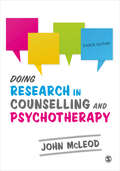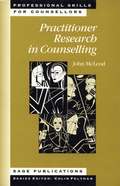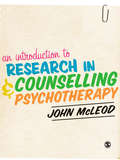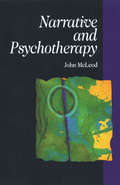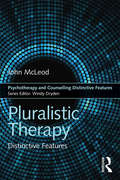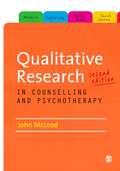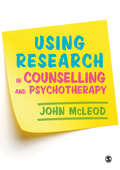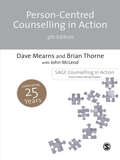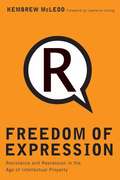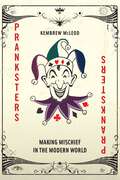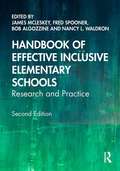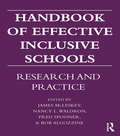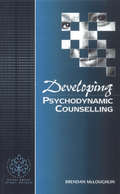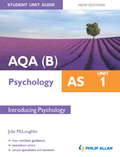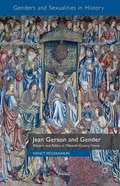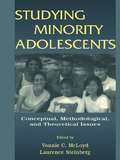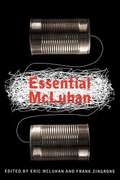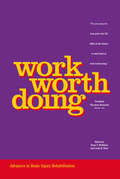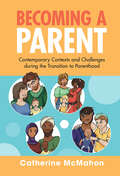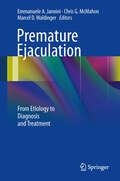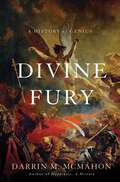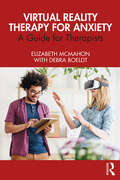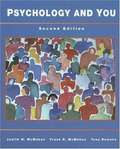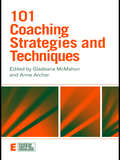- Table View
- List View
Doing Research in Counselling and Psychotherapy
by John McLeodFrom leading researcher and bestselling author, John McLeod, this new edition of Doing Research in Counselling and Psychotherapy is a book for students and practitioners who wish to undertake a small-scale publishable research study. The focus is on research projects that are appropriate for student and practitioner researchers: qualitative interview-based research, practice-based outcome studies, case studies, and autoethnographic research. These different genres of research provide a grounding in the main approaches used in counselling and psychotherapy research. This accessible and comprehensive ′how to′ guide on conducting a successful research project in counselling and psychotherapy takes you step-by-step through the research journey: initial engagement with the idea of doing research, developing a research question, appreciating the strengths and limitations of both qualitative and quantitative methods, conducting a study, and then finally writing up the findings for potential publication. Supported by a wide range of case examples and points for reflection, as well as extensive on-line resources, this highly practical introduction to research in counselling, psychotherapy and allied disciplines is essential reading for any trainee or practitioner learning about the research process for the first time.
Doing Research in Counselling and Psychotherapy
by John McLeodFrom leading researcher and bestselling author, John McLeod, this new edition of Doing Research in Counselling and Psychotherapy is a book for students and practitioners who wish to undertake a small-scale publishable research study. The focus is on research projects that are appropriate for student and practitioner researchers: qualitative interview-based research, practice-based outcome studies, case studies, and autoethnographic research. These different genres of research provide a grounding in the main approaches used in counselling and psychotherapy research. This accessible and comprehensive ′how to′ guide on conducting a successful research project in counselling and psychotherapy takes you step-by-step through the research journey: initial engagement with the idea of doing research, developing a research question, appreciating the strengths and limitations of both qualitative and quantitative methods, conducting a study, and then finally writing up the findings for potential publication. Supported by a wide range of case examples and points for reflection, as well as extensive on-line resources, this highly practical introduction to research in counselling, psychotherapy and allied disciplines is essential reading for any trainee or practitioner learning about the research process for the first time.
An Introduction to Research in Counselling and Psychotherapy (Professional Skills for Counsellors Series)
by John McleodIntroducing the basic principles of research theory and practice, this book is the ideal starter text for any counselling trainee or practitioner learning about the research process for the first time. Structured around common training topics, the book: - Explains why you need to do research at all: what it is, why it's important and its historical and philosophical context - Guides you through the confusing mass of research literature - Covers the ins and outs of actually doing research: practical and ethical issues - Helps you get the most out of research - how to evaluate the outcomes and use research to investigate the process of therapy. Written in a language familiar to first-year trainees and using a range of features to enhance learning, this accessible introduction will equip both trainees and qualified therapists with the essential nuts and bolts to understand research. John McLeod is Emeritus Professor of Counselling at the University of Abertay Dundee and adjunct Professor at the University of Oslo, Norway.
An Introduction to Research in Counselling and Psychotherapy
by John McLeodIntroducing the basic principles of research theory and practice, this book is the ideal starter text for any counselling trainee or practitioner learning about the research process for the first time. Structured around common training topics, the book: - Explains why you need to do research at all: what it is, why it's important and its historical and philosophical context - Guides you through the confusing mass of research literature - Covers the ins and outs of actually doing research: practical and ethical issues - Helps you get the most out of research - how to evaluate the outcomes and use research to investigate the process of therapy. Written in a language familiar to first-year trainees and using a range of features to enhance learning, this accessible introduction will equip both trainees and qualified therapists with the essential nuts and bolts to understand research. John McLeod is Emeritus Professor of Counselling at the University of Abertay Dundee and adjunct Professor at the University of Oslo, Norway.
Narrative and Psychotherapy: Practice, Theory And Research
by John McLeodThe core of psychotherapy can be seen as a process in which the client comes to tell, and then re-author, an individual life-story or personal narrative. The author of this book argues that all therapies are, therefore, narrative therapies, and that the counselling experience can be understood in terms of telling and retelling stories. If the story is not heard, then the therapist and the client are deprived of the most effective and mutually involving mode of discourse open to them. Taking a narrative approach also requires thinking about the nature of truth, the concept of the person, the relationship between therapist and client, and the knowledge base of psychotherapy. John McLeod examines the role and significance of stories in psychotherapy from within a broad-based cultural and theoretical framework.
Pluralistic Therapy: Distinctive Features (Psychotherapy and Counselling Distinctive Features)
by John McLeodPluralistic Therapy: Distinctive Features offers an introduction to what is distinctive about this increasingly popular method. Written by one of the co-founders of pluralistic therapy, and a leading UK figure in counselling and psychotherapy, this book describes 15 theoretical features and 15 practical techniques for practitioners. Pluralistic therapy is a flexible, integrative approach to counselling and psychotherapy, which has also found applications in fields such as mental health, life coaching and careers guidance. Pluralistic Therapy: Distinctive Features will provide an essential guide to students and practitioners of psychotherapy, or an allied area of practice, who are open to learning about new ideas and techniques from current interdisciplinary research.
Qualitative Research in Counselling and Psychotherapy (Counseling Theory Ser.)
by John McleodMany of the techniques and skills of qualitative research will already be familiar to therapists, says McLoed (emeritus, counseling, U. of Abertay Dundee, Scotland), such as eliciting people's stories, sensitive listening, and building up and assessing an understanding. Writing for students and trainees, but also experienced professionals, he describes methods that have been used for qualitative research in counseling and psychotherapy, summarizes and discusses examples, and critically reviews issues and controversies surrounding it. Among his topics are phenomenological research, analyzing conversation and discourse, using participation in inquiry to enhance practical knowing, and the concept of validity. The first edition was published in 2001. Annotation ©2011 Book News, Inc. , Portland, OR (booknews. com)
Using Research in Counselling and Psychotherapy
by John McLeodIn this book bestselling author John McLeod examines the multiple ways in which research can be used to inform and enhance counselling practice. The author discusses how research impacts on policy and practice, covering research knowledge, values, research awareness and skills. Further chapters cover: Using research to understand the therapy process and outcomes Using research to make sense of other lives Using client feedback to enhance practice Using research to build professional networks and effective organisations. The book can be used throughout training on counselling, psychotherapy and counselling psychology courses, to support the development of professional competencies and personal development. It will also be valuable reading for both practitioners and researchers.
Person-Centred Counselling in Action (Counselling in Action)
by John Mcleod Dave Mearns Brian ThorneIt is now 25 years since the first edition of Person-Centred Counselling in Action appeared, offering the definitive exposition of the theory and practice of the person-centred approach. Since then the book has supported and inspired hundreds of thousands of trainees and practitioners worldwide. This important Fourth Edition maintains the book's accessibility, clarity and verve whilst incorporating new developments in the approach. John McLeod joins authors Dave Mearns and Brian Thorne to contribute an exciting new chapter on research relevant to the person-centred field. Person-Centred Counselling in Action, Fourth Edition will be an invaluable resource for those embarking on their first stages of training. Well-established practitioners and even seasoned scholars will continue to find much to interest and stimulate them. Dave Mearns is professor of counselling and retired Director of the Counselling Unit of the University of Strathclyde. He has written seven books including Working at Relational Depth in Counselling and Psychotherapy (with Mick Cooper) and is co-editor of the international journal, Person-Centered and Experiential Psychotherapies. Brian Thorne is Emeritus Professor of Counselling at the University of East Anglia, Norwich where he was previously Director of Counselling and of the Centre for Counselling Studies. He is also a Co-founder of the Norwich Centre and continues to work there as a Professional Fellow. John McLeod is Emeritus Professor of Counselling at the University of Abertay Dundee and adjunct Professor of Psychology at the University of Oslo, Norway.
Freedom of Expression: Resistance and Repression in the Age of Intellectual Property
by Kembrew McleodThis is about the ways in which intellectual property laws have been used to privatize all forms of expression including the right of speech.
Pranksters: Making Mischief in the Modern World
by Kembrew McleodFrom Benjamin Franklin's newspaper hoax that faked the death of his rival to Abbie Hoffman's attempt to levitate the Pentagon, pranksters, hoaxers, and con artists have caused confusion, disorder, and laughter in Western society for centuries. Profiling the most notorious mischief makers from the 1600s to the present day, Pranksters explores how "pranks" are part of a long tradition of speaking truth to power and social critique. Invoking such historical and contemporary figures as P.T. Barnum, Jonathan Swift, WITCH, The Yes Men, and Stephen Colbert, Kembrew McLeod shows how staged spectacles that balance the serious and humorous can spark important public conversations. In some instances, tricksters have incited social change (and unfortunate prank blowback) by manipulating various forms of media, from newspapers to YouTube. For example, in the 1960s, self-proclaimed "professional hoaxer" Alan Abel lampooned America's hypocritical sexual mores by using conservative rhetoric to fool the news media into covering a satirical organization that advocated clothing naked animals. In the 1990s, Sub Pop Records then-receptionist Megan Jasper satirized the commodification of alternative music culture by pranking the New York Times into reporting on her fake lexicon of "grunge speak." Throughout this book, McLeod shows how pranks interrupt the daily flow of approved information and news, using humor to underscore larger, pointed truths. Written in an accessible, story-driven style, Pranksters reveals how mischief makers have left their shocking, entertaining, and educational mark on modern political and social life.
Handbook of Effective Inclusive Elementary Schools: Research and Practice
by James McLeskeyNow in its Second Edition, this seminal handbook offers a comprehensive exploration of how students with disabilities might be provided classrooms and schools that are both inclusive and effective. With an enhanced focus on the elementary level, this new edition provides readers with a richer, more holistic understanding of how inclusive settings operate in K-5, featuring expanded chapters on principal engagement, teacher preparation, district-level support, school-based improvement practices, and more. Fully revised and updated to reflect changes in the field, each chapter synthesizes the research, explores if and how this knowledge is currently used in schools, and addresses the implications for practice and directions for future research.
Handbook of Effective Inclusive Schools: Research and Practice
by James McLeskey Nancy L. Waldron Fred Spooner Bob AlgozzineOver the last decade, the educational context for students with disabilities has significantly changed primarily as a result of mandates contained in NCLB and IDEA. The purpose of this book is to summarize the research literature regarding how students might be provided classrooms and schools that are both inclusive and effective. Inclusive schools are defined as places where students with disabilities are valued and active participants in academic and social activities and are given supports that help them succeed. Effectiveness is addressed within the current movement toward multi-tiered systems of support and evidence-based practices that meet the demands of high-stakes accountability.
Developing Psychodynamic Counselling (Developing Counselling series #4)
by Brendan Mcloughlin`This book deals with many aspects of psychodynamic counselling from the minutiae of the extrinsic context, such as decor, through the "therapeutic stance of attentive reserve" on to an elaboration of the elements of a therapeutic relationship. . . the book is liberally garnished with case studies. . . informative and thought-provoking. . . a useful resource to those teaching psychodynamic principles. . . If you are new to psychodynamic work, this book could be a safe and helpful guide. . . The ideas and techniques offered by the author may also prove intriguing and even inspiring to those (like me) from a different therapeutic orientation' - The International Journal of Social Psychiatry Psychodynamic counselling has developed from the psychoanalytic tradition inaugurated by Freud. At its core is a belief in the role of the unconscious in the development of conflict and disturbance, which may be resolved through the careful unfolding of the therapeutic relationship via the transference/counter-transference dynamic and within a defined setting. Integrating theory and context, this book explores the opportunities for counsellors to develop their own practice of psychodynamic counselling. The author encourages readers to look carefully at the way they work and to think about strategies to improve their skills in a specialized form of relating. He examines areas crucial to the psychodynamic approach, including internal and external settings, working with issues around boundaries, and transference and counter-transference.
AQA(B) AS Psychology Student Unit Guide New Edition: Unit 1 Introducing Psychology
by Julie McLoughlinWritten by a senior examiner, Julie McLoughlin, this AQA(B) AS Psychology Student Unit Guide is the essential study companion for Unit 1: Introducing Psychology.This full-colour book includes all you need to know to prepare for your unit exam: clear guidance on the content of the unit, with topic summaries, knowledge check questions and a quick-reference index examiner's advice throughout, so you will know what to expect in the exam and will be able to demonstrate the skills required exam-style questions, with graded student responses, so you can see clearly what is required to get a better grade
Jean Gerson and Gender
by Nancy McloughlinJean Gerson and Gender reconciles the somewhat enigmatic legacy of one of the most influential late medieval intellectuals: the theologian, court preacher, university chancellor, and church reformer, Jean Gerson (d. 1429). Gerson provided foundational contributions to two historical developments: the promotion of rational and just government, and the development of the European concept of the witch. This book argues that Gerson's association of royal and ascetic women with sin and diabolical influences allowed him to maintain - against overwhelming evidence to the contrary – the appearance of centralized monarchical rule, a stable ecclesiastical hierarchy, and a reliable method for constructing communally verifiable political and religious truths.
Studying Minority Adolescents: Conceptual, Methodological, and Theoretical Issues
by Vonnie C. McLoyd Laurence SteinbergIn the burgeoning research literature on adolescents, the relative paucity of work examining ethnic variations in developmental processes is a glaring gap, particularly because approximately one third of American young people now come from an ethnic minority background. A primary factor in this research imbalance has been the lack of training in methods and research instruments needed to properly study ethnically diverse populations. This book was developed in response to this need. Its chief objective is to present recent theoretical, conceptual, and methodological advances in the study of ethnicity and development during adolescence. The chapters address fundamental and enduring issues concerning the incorporation of ethnicity into research designs. Topics such as demographics, "ethnicity-friendly" research paradigms, and practical challenges that arise throughout the research cycle are addressed by scholars who have "been there" and learned how to successfully study the effects of race and ethnicity on developmental processes and outcomes. Established scholars and newcomers to research, working both in academic and applied settings with adolescents as their focus, will find this book a valuable resource.
The Essential McLuhan
by Eric Mcluhan Frank Zingrone Marshall McluhanMarshall McLuhan's insights are fresher and more applicable today than when he first announced them to a startled world. A whole new generation is turning to his work to understand a global village.
Work Worth Doing: Advances in Brain Injury Rehabilitation
by Brian T. Mcmahon Linda R. ShawPresident Theodore Roosevelt once said, "Far and away the best prize that life offers is the chance to work hard at work worth doing." This quote is not only the source from which the title was borne, but also the philosophical approach toward TBI rehabilitation embraced by the 26 rehabilitation experts who wrote Work Worth Doing: Advances in Brain Injury Rehabilitation. This important, and possibly controversial, book of issues and methods addresses the full spectrum of vocational rehabilitation activities. Independent living, treatment generalization, criteria for evaluating TBI rehabilitation facilities, family involvement issues, and an entirely new perspective on the TBI rehabilitation industry are discussed.
Becoming a Parent: Contemporary Contexts and Challenges during the Transition to Parenthood
by Catherine A. McMahonThe contexts for becoming a parent are ever-changing, bringing new opportunities and new challenges. Becoming a Parent examines the transition to parenthood from diverse perspectives – it is about becoming, rather than being a parent. Drawing on a large body of theory and research, the book explores universal psychological journeys as well as the specific challenges faced by those whose pathways to parenthood are non-traditional or medically complicated. It also examines the unprecedented reproductive choices in contemporary society and provides a comprehensive overview of the personal and social impact of reproductive technologies. Pregnancy, childbirth, and early parenthood (the so-called 'fourth trimester') are discussed in detail and illustrated with case anecdotes and personal stories of people with 'high-risk' pregnancies, fathers as well as mothers, adoptive parents, and LGBTQ as well as heterosexual adults. It concludes with social and policy initiatives that can better support positive adaptation during this crucial life transition.
Premature Ejaculation
by Chris G. Mcmahon Emmanuele A. Jannini Marcel D. WaldingerPremature ejaculation (PE) is a common male sexual complaint, with a self-reported prevalence of 20-30% in observational studies. Over the past 10-20 years, our understanding of PE has evolved from the initial premise that it is a psychological disorder to the current recognition of an underlying biological and probably genetic predisposition in many cases. This new understanding has been accompanied by novel approaches to the assessment and treatment of patients with PE. Premature Ejaculation is the first truly contemporary reference volume on the subject. It covers a broad range of aspects relevant to PE, including past and current definitions of the condition, the etiology of PE, its epidemiology, the impact of PE on both the patient and his partner, and the treatment of PE using pharmacotherapy and/or psychotherapy/cognitive behavioral therapy. The book is well illustrated and referenced, and the primary focus throughout is on evidence-based medicine. This timely and authoritative volume will be of great value to sexual health physicians, andrologists, endocrinologists, urologists, psychiatrists, sexologists, psychologists, and other interested healthcare professionals.
Divine Fury: A History of Genius
by Darrin M. McmahonGenius. The word connotes an almost unworldly power: the power to create, to grasp universal secrets, even to destroy. As renowned intellectual historian Darrin McMahon explains in "Divine Fury," the concept of genius can be traced back to antiquity, when men of great insight were thought to be advised by demons. The modern idea of genius emerged in tension with a growing belief in human equality; contesting the notion that all are created equal, geniuses served to dramatize the exception of extraordinary individuals not governed by ordinary laws. Today, the idea of genius has become cheapened?rock stars and football coaches earn the term with seemingly the same ease as astrophysicists and philosophers?yet our enduring fascination with it reflects the desires, needs, and fears of ordinary human beings. The first comprehensive history of this mysterious yet foundational concept, "Divine Fury" follows the fortunes of genius from Socrates to Napoleon to Einstein and beyond, analyzing its democratization, disappearance, and potential rebirth.
Virtual Reality Therapy for Anxiety: A Guide for Therapists
by Elizabeth McMahon Debra BoeldtPractical, down to earth, clearly written, and easy for therapists to understand and apply, Virtual Reality Therapy for Anxiety is a useful guide for any clinician treating anxiety, regardless of setting (in-office or via telehealth), theoretical orientation, or level of training. Written by an experienced psychologist who has used multiple VR systems since 2010, it’s the only up to date, clinically informed, evidence-based training manual available. Easy-to-understand concepts and diagrams explain anxiety and its treatment, and the book incorporates research findings and clinical expertise. VRT is described step by step with multiple case examples, and an extended case-vignette chapter presents a session-by-session treatment protocol of a complex case with transcript excerpts. Key findings and quotations from research are also presented. After completing the guide, therapists and other mental health professionals will understand the unique clinical benefits of VR, be prepared to use VR in therapy comfortably and effectively either in the office or remotely, and will have expertise in a new, needed, and empirically validated treatment for a common clinical problem.
Psychology and You (2nd edition)
by Frank B. Mcmahon Judith W. Mcmahon Tony RomanoFor most people, a psychologist is someone who sits across from you, listens to your problems, and tries to help. There are more than 100,000 psychologists in the United States, and roughly a third do in fact deal with personal problems. But that leaves two-thirds of the group doing something else.
101 Coaching Strategies and Techniques (Essential Coaching Skills and Knowledge)
by Gladeana McMahon101 Coaching Strategies and Techniques provides focused, practical strategies to help the coach with their work. Each point provides a detailed explanation of the strategy together with potential pitfalls and solutions. Contributors from a range of coaching backgrounds are brought together to cover a number of issues faced by professional coaches including: confidence building developing specific skills and strategies group coaching problem solving and creativity self awareness the stuck client. 101 Coaching Strategies and Techniques will be a handy reference tool for busy coaches; the bite-sized strategies will also provide a useful guide for those in training.
